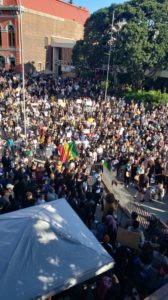The institution of the police is not a force for good. I don’t care if you know “one of the good ones”—the institution is not good.
Communities of colour, specifically Black and Indigenous communities, have been saying this for years, and it is profoundly violent that we’ve had to broadcast the murders of Black people to take it seriously.
The system of policing has been broken since its inception. While I firmly believe that the astronomical funding police forces receive must be reallocated to social programs, there is no one-size-fits-all solution. Every community will need to assess their needs and design a safety structure that makes sense for them.
For some communities, that may mean a complete dismantling of the force and ground-up rebuild of community-safety measures that result in de-escalation and treatment instead of compliance and trauma.
For others, it may mean a drastic reallocation of funding while maintaining a small team of officers to investigate serious criminal offenses.

This concept is fluid and will require significant activist, government, and community involvement to be figured out. I don’t have all the answers; I don’t know anyone arguing for this action who does. But I think we owe it to the people in our community for whom the police have been a source of terror, not of safety, to change, because it is literally a matter of life and death.
On June 4, Chantel Moore, an Indigenous woman from Tla-o-qui-aht First Nation here on the island, was murdered in New Brunswick by a police officer that was supposed to be ensuring her safety. On May 27, Regis Korchinski-Paquet, an Indigenous-Black woman in Toronto, fell 24 stories from her balcony with multiple police officers beside her. On March 10, Athabasca Chipewyan chief Allan Adam was brutalized by police officers after being pulled over for having expired license plates.
These instances are not few and far between. Rather, they are the lived experiences of BIPOC across our country. The institution of the police has proven itself time and time again to be incapable of providing community safety for all Canadians. If any other institution was so wildly incapable of doing their job we would divert their funding and find another solution instead of throwing money at the problem.
When I say “defund the police,” it’s a reasonable and ethical response to a longstanding problem. The police have devastated Black and Indigenous communities and have functioned to reinforce white supremacy since its inception. Read up on starlight tours, Africville, and the pass system if the Sixties Scoop, residential school enforcement, and the National Inquiry into Missing and Murdered Indigenous Women aren’t enough to convince you.
When I say “defund the police,” I propose reallocating the funding from police budgets into social services and public works. For example, the Victoria Police Department 2020 budget is more than $58 million. Some of that $58 million could be far better spent addressing the roots of criminality.
What activists and abolitionists propose is a community safety structure that does not prioritize an armed response to non-violent issues.
Instead of police officers attending a call for a wellness check, it could be a social worker, who is trained in de-escalation and crisis response, answering the call.
Instead of armed cops rolling up on a homeless person sleeping in the rain, it could be a worker from a local shelter that now has enough funding to provide beds and food for anyone who needs it.
This could allow investigators to focus on severe crimes. This is not a pipe dream.
Because police are clearly not equipped to handle the complex issues they are presented with; because no one is safe until everyone is safe; because Black lives matter, we must push our government to defund the police.
